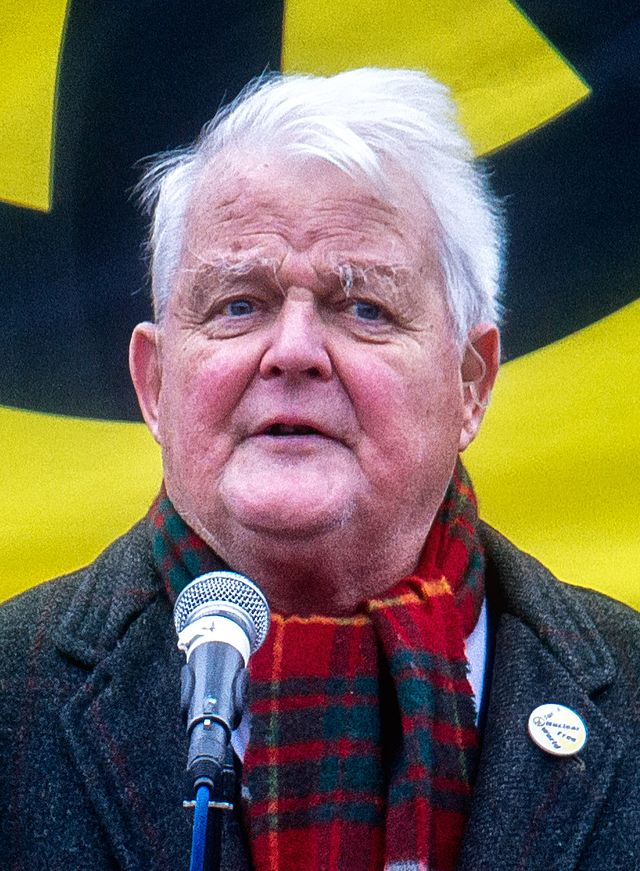
Bruce Kent was a friend and fellow international campaigner for peace with many of us in Another Europe is Possible. Our last memories of him are of his strongly felt protest at the Russian Embassy at Putin’s invasion of Ukraine. The eloquent letter he sent to the Ambassador in early March was typical Bruce, expressing deep concern at the increased risk of the use of nuclear weapons and the danger this posed to the whole world. It clearly stated his and CND’s support for all those in Russia and beyond who are protesting against the invasion of Ukraine: Bruce Kent at Russian Embassy: Full Letter Text – (cnduk.org).
Bruce was an inspiring, witty and humane speaker but another of his special qualities, which lies behind the flood of tributes, was his stalwart and unassuming participation in almost all peace movement demonstrations and events. Regardless of any infirmity he suffered with age, Bruce Kent would be there. I vividly remember chatting to him as he perched, somewhat precariously, on his mobile stool waiting to follow a motley line up of speakers (Scottish Nationalists, Greens, Labour left, Stop The War and more) to oppose the renewal of Trident.
Bruce’s anti-sectarian, generous-spirited values led him always to welcome the widening of the peace movement, whether through the creativity of the women of the peace camp against US missiles at Greenhamand at peace protests at Menwith Hill and other US bases or the focused national mobilisations of Stop the War or the sustained research and campaigning of Campaign Against the Arms Trade (CAAT). This ability to welcome new and independent initiatives is one of many factors explaining the remarkable longevity, extensive reach and continued relevance of CND from its foundation in 1958 as fear of nuclear conflict first emerged to the very real dangers of the use of nuclear weapons posed now by the war in Ukraine.
Bruce Kent shared much with Bertrand Russell, another far-seeing, sharp-minded and fearless campaigner against the inhumane insanity of nuclear weapons. Perhaps he was inspired in his own opposition to nuclear weapons by the ringing words of the Russell-Einstein manifesto in which the signers speak “not as members of this or that nation, continent, or creed, but as human beings, members of the species Man, whose continued existence is in doubt… All, equally, are in peril” and conclude, with a ringing Russellian appeal: “We appeal, as human beings, to human beings: Remember your humanity, and forget the rest. If you can do so, the way lies open to a new Paradise; if you cannot, there lies before you the risk of universal death.“
Of course, the difference is that Bruce Kent’s opposition to nuclear weapons was rooted in his Christian beliefs whereas Russell was an atheist. Kent however, like Russell, had no hesitation in being frankly critical of the organised church. In an interview with Red Pepper on the occasion of the protest outside the Russian Embassy, he expressed his irritation at a bishop who does not see the importance of challenging the military as part of action on climate change: “I believe his denial of awareness” said Bruce, “but how could the military not be an issue in terms of CO2 production? There’s a financial disincentive for the church challenging the military.”
My last memory of Bruce was at the celebrations of the 150th anniversary of Russell’s birthday on 18th May, frailer than at the Russian embassy, but listening intently on the front row to readings from Bertrand Russell.
Our best tribute to Bruce is actively to remember him by strengthening the opposition to nuclear weapons. This eloquent exhortation of Russell’s – of which Bruce would have approved as he listened on May 18th – can provide our inspiration:
“We have to learn to think in a new way…. Shall we put an end to the human race; or shall mankind renounce war?“
To join CND, see Home page – (cnduk.org).
13th June 2022
